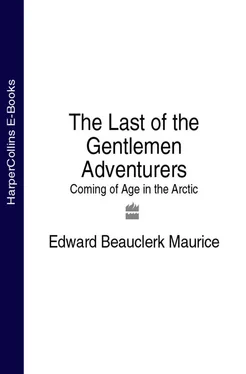We were to be apprenticed to the fur trade ‘somewhere in Canada’. In age we were between sixteen and twenty-three. In occupation there were schoolboys, farm labourers, office workers, factory workers, estate workers, forestry people and even two seamen.
We had been told of the wonderful opportunities that awaited us, but what our informants had not known was that the worst depression the world would experience for many years was fast developing. Already the feverish post-war boom was collapsing. The sudden loss of confidence and the general insecurity of the world markets was soon to undermine the fur trade. Before some of us had finally reached our new homes, the whole department responsible for our engagement had been disbanded, with its members released to swell the ever growing ranks of the unemployed. Never again would a party such as ours gather in London.
An oriental philosopher once wrote that no matter how near or far the destination, every journey must somewhere have a starting point. My journey began in the June of the halcyon summer of 1913, to which so many thousands of women were to look back with aching nostalgia for all the rest of their years.
The shadow fell across my mother’s life sooner than it did for the others. Six weeks before I was born, in the evening of a long midsummer’s day, my father was brought home spread-eagled over a broken gate, dead of a terrible gunshot wound to the head.
Controversy, seemingly inseparable from the human state even in such tragic circumstances, broke out at once. The vicar refused my grandmother’s request that her son’s body should be brought into the parish church to await burial, on the grounds that he might have committed suicide. The coroner would have to give him earthly clearance from this suspicion before the church could grant him asylum. The clergyman had mistakenly supposed his parishioner, my grandmother, to be a meek and pious woman, an error he was never to repeat. He was astonished by the ferocity with which she defended her son’s right to rest in the church, and reluctantly gave way.
So my father, poised as it were on the very threshold of eternity, was brought for the last time into the cool, dim, silent shadow of the ancient building, perhaps there to find the peace he had been seeking. The following day the coroner decided that death had been due to misadventure, thus calming the vicar’s disquiet and giving at least some hope of an onward journey to heaven. For those that were left on earth, and in particular for my mother, the problems were just beginning.
Aged twenty-three, with three children already and a fourth expected, her outlook was bleak indeed, for there was no provision at that time for disasters such as this. No help could be expected from the state, since there was no social security or child allowances. Those who fell by the wayside, whether it was their own fault or not, had to pick themselves up or, as a last desperate measure, appeal to the workhouse guardians for relief.
My grandmother then decided she was in need of a housekeeping companion and that her daughter-in-law could fill this position. There would be no pay as such, but food for the young widow and her children would be provided, sparingly as it turned out, and even more sparingly, clothes. Children’s garments could be made from oddments, sewn, knitted and handed down. As for my mother, now that she was a widow and would wear black for the rest of her life as Queen Victoria had done, she could inherit the old lady’s cast-offs, suitably trimmed to size and shape.
This was how my family came to live in a large, cold Victorian house in a small township on the north Somersetshire coast. My mother brought with her all that she possessed in the world. A few items of bedroom furniture. A dressing table and a little jewellery, a few books and a Colt revolver with six rounds of ammunition. What desperate resolve prompted her to bring these last two items I do not know, nor did I ever inquire.
The year after our arrival, 1914, the Great War broke out. Perhaps the atmosphere of emergency and the heavy emotional demands made upon most of the young women of her generation helped my mother resign herself, at least temporarily, to living the routine of her elderly mother-in-law.
As children we were happy enough, fitting ourselves, as children do, into the circumstances that surrounded us, but mother had to suppress much of her natural jollity, acting as a buffer between her often noisy children at the top of the house and the solemn, easily disturbed downstairs of our grandmother.
Grandmother did not believe in the classless society. Indeed, so convinced was she of her own social superiority that there was not one single person in that Somersetshire township who could justifiably be invited to take tea with her. Ranged behind her in defence of her position were several dukes and other aristocrats, closely followed by admirals, generals and the like, some of whom gazed down at us from the walls of the stairways and downstairs rooms. This meant that there was very little social life to enliven the dull days for mother.
A room at the top of the house was set aside to be used as a school, and armed with a selection of rather aged textbooks, the young widow began the education of her children, my eldest brother being already over four years old. The knowledge contained in these textbooks was rigorously drummed into our heads, for mother was aware of the necessity of obtaining an education of a higher standard than that offered by the free schools, if one was to prosper, and the only way to do this would be by gaining scholarships or similar awards.
One day a visitor called who had heard about a well-known boarding school that had been established with the sole aim of educating suitable children whose parents did not have the available funds. A great number of good people contributed money to the school, and if their contribution was sufficiently large, they were allowed to place an approved child there. I think mother must have written to every single benefactor in order to gain places for her children, and she eventually succeeded in obtaining one for each of us, three boys at the boys’ school and our sister at the girls’ establishment.
The schooling provided was sound, practical and aimed at producing adaptable adults, able to use such common sense as they possessed. Aware of the undoubted benefits of such an education, I would like to be able to record that this was a happy period of my life. Alas, this was not so. From the very start, the school was like some sort of prison. On my second day I quite unwittingly broke some obscure rule, for which the housemaster, no doubt a brilliant mathematician, but lacking in any noticeably human attributes, accorded me a public beating. A suitably sour start to a relationship which was to lack warmth for the next seven years.
As time went by, my mother began to think increasingly of escape from the situation which had trapped her for so long. The atmosphere in the old lady’s house was not a happy one and my mother longed to go to the other side of the world and start afresh. We had no money, but could work hard and New Zealand sounded like a land of opportunity.
My brother blazed the trail by setting off just after the General Strike of 1926, helping to stoke the boilers of an ancient coal burner as it steamed across the Pacific Ocean. He was to work on farms in New Zealand, and two years later my other brother followed him. The three of us who were left at home were to wait until I had finished school, then set off together.
As the time loomed near, however, my prospective life as a farmworker lost its appeal for me. We wrote letters to everybody we could think of to see if they could squeeze me in somewhere else, but the reply was always the same – too young and no qualifications. Christmas 1929 came and went with the problem no nearer solution, but early in the New Year, a chance happening at school provided a possible answer.
Читать дальше












